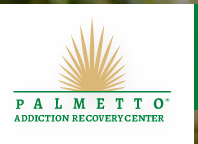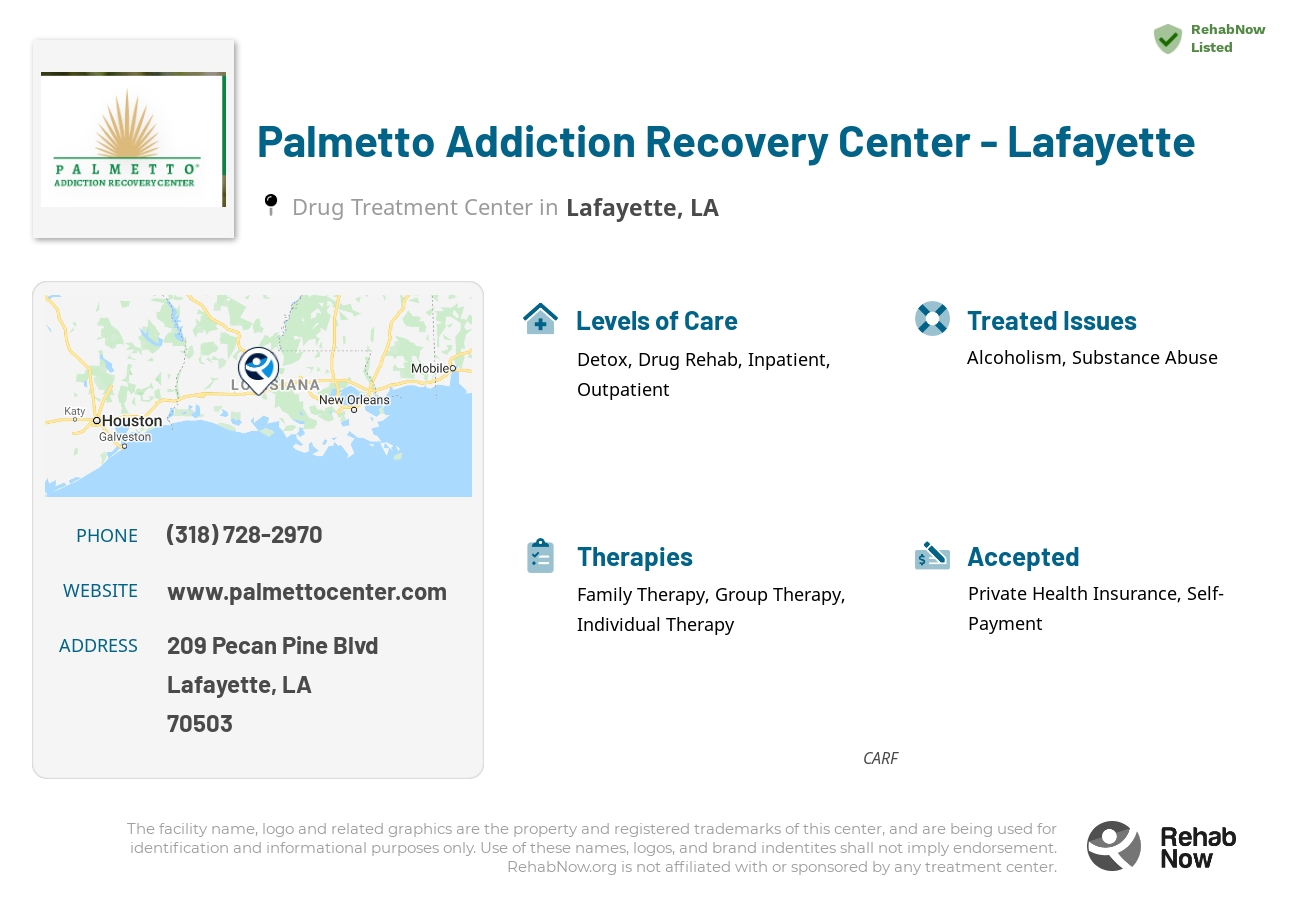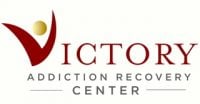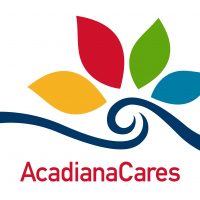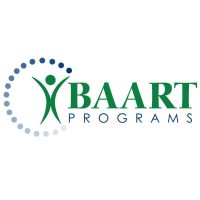Palmetto Addiction Recovery Center - Lafayette
Drug Rehab Center in Lafayette, Louisiana
Palmetto Addiction Recovery Center - Lafayette in Lafayette, Louisiana is a respected treatment facility that specializes in treating alcoholism, substance abuse, drug addiction, and dual diagnosis conditions through a range of comprehensive programs including detoxification, inpatient and outpatient rehab, aftercare support, and more.
About Palmetto Addiction Recovery Center - Lafayette in Louisiana
Located in Lafayette, Louisiana, Palmetto Addiction Recovery Center stands out for offering top-rated treatment for alcoholism, drug addiction, and substance abuse. This private rehab facility is known for its comprehensive approach to overcoming addiction, serving adults nationwide with over 25 years of expertise.
Palmetto Addiction Recovery Center is distinguished by its CARF accreditation, a mark of quality in the addiction recovery services industry. This facility excels in treating a diverse range of addictions and dual diagnosis conditions, offering tailored programs such as detoxification, inpatient and outpatient rehab, and more to foster healing and recovery.
- Specialized in comprehensive care for alcoholism, drug addiction, and substance abuse.
- Offers a wide range of programs including detox, inpatient/outpatient rehab, and aftercare support.
- Provides targeted treatment for dual diagnosis conditions, addressing both addiction and co-occurring mental health issues.
Palmetto Addiction Recovery Center tackles issues with alcohol, drugs, opioids, and dual diagnosis conditions through various treatment methods. These include detoxification, inpatient and outpatient care, partial-hospitalization, and aftercare support, embracing a holistic approach to recovery.
Genders
Ages
Modality
Additional
Accreditations

CARF
The Commission on Accreditation of Rehabilitation Facilities (CARF) is a non-profit organization that specifically accredits rehab organizations. Founded in 1966, CARF's, mission is to help service providers like rehab facilities maintain high standards of care.
Conditions and Issues Treated
A combination of treatments is often needed to treat drug abuse. Some addictions can be treated with counseling and support groups. In other cases, drug abuse can lead to a medical problem and require medical treatment. Treatment for drug addiction typically combines counseling and psychotherapy with medication and behavioral therapies.
A combination of treatments is often needed to treat drug abuse issues effectively. In the case of drug abuse, there is no easy answer or one-size-fits-all cure.
Opioid addiction has become a significant health problem in the United States. In 2015, there were 91 opioid overdose-related deaths per day, with a substantial increase in mortality rate in 2014.
When opioid addiction has reached a point where a person’s life becomes unmanageable, treatment options are available to help them get sober. Treatment that includes medical care with medications and counseling can help a user transition into sobriety.
When someone in struggles with both addiction and mental or emotional illness, this is considered a dual diagnosis. Dual diagnosis treatment can include therapy for these issues to happen simultaneously, which will allow either of them to be treated effectively.
Sometimes people who have suffered from addiction disorder also suffer from co-occurring disorders such as depression, anxiety, bipolar disorder, etc., making them “dual diagnoses.” Dual diagnoses require specialized treatment programs where drug and alcohol addiction are addressed along with psychiatric illnesses. Some rehabilitation facilities provide patients suffering from cooccurrences a program with highly integrated services and a clean environment with few distractions to help them succeed.
Levels of Care Offered
This center offers a variety of custom treatment tailored to individual recovery. Currently available are Aftercare Support, Detox, Drug Rehab, Dual-Diagnosis, Inpatient, Outpatient, Partial-Hospitalization, Residential, with additional therapies available as listed below.
One of the first things an addict should do when entering treatment is to abstain from using illicit drugs completely. Depending on the length of time that the person has been using, the addict may have to go through alcohol or drug withdrawal. Fortunately, detox doesn’t have to be done alone, and withdrawal symptoms can be managed medically in an inpatient or outpatient setting. While detox may be uncomfortable, it is not life-threatening. Detoxification allows the addict to rid the body of all traces of drugs or alcohol and gives the addict a clean slate for their recovery.
Inpatient treatment for alcoholism or drug addiction is an option that provides the addict with a supportive environment in which they can stop using. After detox, an inpatient treatment center provides a structured environment for the addict to recover from their addiction and begin taking steps toward a lifetime of sobriety.
This type of treatment is appropriate for addicts that are most in need of intensive care and supervision. This includes those who were unable to quit on their own, those who need more structure than they can get in outpatient treatment, and those whose addiction has led them into legal trouble or severe health problems.
Outpatient treatment is often used for drug addicts in drug rehab. Outpatient treatment consists of counseling and therapy sessions. This form of treatment is also called ‘day-treatment’. The outpatient treatment process begins with the addict’s initial detox period, lasting about ten days.
Outpatient treatment is used for those who are at moderate risk for ‘slipping back’ into the addiction, for those who:
- Are not currently experiencing any side effects from withdrawal and can handle social pressure
- Can handle stressors that might trigger relapse
- Have a stable living environment or have moved out of their previous environment, which was not conducive to being sober
- Have a support system that allows them to go to a facility a few times a week while still keeping their current responsibilities
- Have no legal obligations, being either on parole or probation, that require them to seek treatment at a mandatory facility
- Are not currently experiencing any side effects from withdrawal and can handle social pressure
- Have a stable living environment or have moved out of their previous environment, which was not conducive to being sober
Partial hospitalization programs offer another level of addiction treatment at Palmetto Addiction Recovery Center - Lafayette.
Residential treatment programs are those that offer housing and meals in addition to substance abuse treatment. Rehab facilities that offer residential treatment allow patients to focus solely on recovery, in an environment totally separate from their lives. Some rehab centers specialize in short-term residential treatment (a few days to a week or two), while others solely provide treatment on a long-term basis (several weeks to months). Some offer both, and tailor treatment to the patient’s individual requirements.
Completing a drug or alcohol rehab program is only the first step. Then comes aftercare support. These services include sober living accommodations, career counseling, and AA/NA programs for those struggling with sobriety or who want help maintaining it after initial rehab at an addiction facility.
They can last up to a year or more depending on what’s needed most urgently after the earlier stages are completed.
Therapies & Programs
Because no single treatment is effective for all addicts, the goal of treatment and therapy should be to figure out what works best for each individual. Tolerance and withdrawal levels differ from person to person, affecting the treatment intensity required. Addiction treatment should aim to help addicts develop healthy coping mechanisms for dealing with their addiction and its underlying causes.
Couples therapy works with clients and significant others in a professional capacity to improve relationship dynamics. This can be helpful for addicts who are trying to marry the idea of recovery into their work, family, social lives – any aspect that has to do with relationships. Through counseling sessions, addicts will have an opportunity to talk about their addiction with professional partners.
Family therapy is beneficial for people who are in addiction treatment services because it offers addicts the opportunity to work with their family members to better understand what led them to make choices that contributed to their addiction.
This type of therapy helps family members reach a deeper understanding of how they can best support their loved one during recovery. It also helps the addict better understand their own motivations and triggers that led them to turn to substance abuse.
Family therapy can help addicts in the following ways:
- Assists family members in processing difficult feelings so they don’t blame or resent recovering addicts
- Assists family members in understanding how addiction has impacted the addict and everyone who is involved with them
- Allows the addict to take responsibility for their actions, while encouraging improved communication skills
- Helps family members understand how to best support an individual in recovery so addicts don’t relapse again.
Group therapy can help build a stronger support system and give addicts in Lafayette, LA insight into their addiction that they gain through shared conversations. Group therapy occurs in a controlled group environment, exclusive of one on one meetings. This makes it safer for patients to feel comfortable sharing the struggles they’re going through and gaining perspective.
Trauma therapy is beneficial for people who are recovering from drug addiction because it helps them heal from past traumas that may have caused them to turn to harmful substances or led them to experience negative emotions that contributed to their destructive behaviors.
This type of treatment works by processing difficult experiences so individuals can learn how to process these events without having to turn to substances for coping.
Trauma therapy can help addicts in the following ways:
- Helps individuals understand their experiences and emotional responses to difficult events, including why they turned to drugs or alcohol
- Provides them with comfort and support while working through difficult emotions related to these traumatic experiences
- Offers an opportunity for addicts to have a voice and be heard, which can improve their self-esteem
- Can help them develop coping skills so they can better respond to triggers instead of turning to substance abuse.
Dialectical Behavior Therapy (DBT) is a cognitive-behavioral therapy that helps patients understand the relationship between their thoughts, feelings, and behaviors. It is beneficial for those whose addictions and behaviors stem from severe mental health issues. The term “Dialectic” means the integration of opposites. In substance abuse, DBT refers to accepting the patient’s addiction and working to change their thoughts and behavior. It improves life skills such as controlling intense emotions without reacting impulsively, resolving interpersonal conflicts effectively, and promoting awareness about self and others.
Cognitive-behavioral therapy is a technique that is used to help people with addiction. Specifically, it is a way of identifying thoughts and behaviors that cause the addiction. It is typically used in an individual counseling session.
The content explains cognitive behavioral therapy and how it works to address some behaviors that may be leading to unintended consequences in their life, as well as its benefits for those seeking sobriety.
It works by helping people to talk through their issues and addressing the thoughts that cause said behaviors. It is an excellent way of learning about oneself and one’s perception of the world.
Addicts seeking sobriety can find quick results with Rational Emotional Behavior Therapy. This type of counseling offered by Palmetto Addiction Recovery Center - Lafayette replaces negative and self-limiting thoughts with positive and productive behaviors. This allows addicts to move forward without having to deal with ongoing treatment throughout their lives. Individuals who are seeking sobriety can find quick results with Rational Emotional Behavior Therapy.
The 12-step program is a common method used to treat addiction. It is successful for many people and includes acknowledging the problem, making changes, and honesty. The program is available in most cities in the United States and helps those addicted to drugs or alcohol achieve sobriety. In this program, peers help each other achieve the goal of abstinence.
The 12 steps dictate that individuals accept that they are addicts and understand the consequences of their addiction. They then work towards recovery and make amends to others they have hurt. The process of cognitive restructuring helps individuals change their negative thoughts into positive ones. The 12-step program provides the benefit of building a support network, which is essential for recovery.
Behavioral therapies, such as contingency management, are widely used to improve drug addiction outcomes. Contingency management is a type of CM that uses rewards to increase desired behaviors, such as abstinence. LPE is a highly effective and low-cost treatment that has been used with populations across the intellectual and developmental spectrum for decades. It is based on the principle that reinforcing desired behavior will increase the likelihood of that behavior occurring again in the future.
LPE has become an integral component of outpatient substance abuse treatment and relapse prevention for both adults and adolescents. It is similar to contingency management programs used in substance abuse treatment, and clinical studies have shown that it can effectively treat drug addiction, reduce the number of days using drugs, and prevent relapse.
Payment Options Accepted
For specific insurance or payment methods please contact us.
Is your insurance accepted?
Ask an expert, call (888) 674-0062
Palmetto Addiction Recovery Center Associated Centers
Discover treatment facilities under the same provider.
- Palmetto Addiction Recovery Center - Monroe in Monroe, LA
- Palmetto Addiction Recovery Center - Rayville in Rayville, LA
- Palmetto Addiction Recovery Center - Metairie in Metairie, LA
- Palmetto Addiction Recovery Center - Lake Charles in Lake Charles, LA
- Palmetto Addiction Recovery Center - Shreveport in Shreveport, LA
Learn More About Palmetto Addiction Recovery Center Centers
Additional Details
Specifics, location, and helpful extra information.
Lafayette, Louisiana 70503 Phone Number(318) 728-2970 Meta DetailsUpdated April 15, 2024
Staff Verified
Palmetto Addiction Recovery Center - Lafayette Patient Reviews
There are no reviews yet. Be the first one to write one.
Lafayette, Louisiana Addiction Information
Louisiana is one of the top ten states in the nation for opioid-related deaths. One in ten high school students admits to regularly using prescription opioids for non-medical purposes. More than 225,000 Louisiana residents admit to regular heavy drinking and around 6% of the Louisiana population abuses alcohol. Marijuana use in Louisiana is most common amongst teenagers between the ages of 12 and 17 years old.
Lafayette, LA, has a moderate to a high drug addiction problem. 18.8% of residents reported binge drinking in the past month. Most of the overdose deaths in the city were caused by prescription drugs, specifically opioids. There are a variety of drug treatment options available in Lafayette, Louisiana. Some common drug rehab programs include inpatient rehab, outpatient rehab, and detox programs.
Treatment in Nearby Cities
- Marksville, LA (66.1 mi.)
- Springfield, LA (92.1 mi.)
- Shreveport, LA (190.9 mi.)
- Natchitoches, LA (125.6 mi.)
- Zachary, LA (63.3 mi.)
Centers near Palmetto Addiction Recovery Center - Lafayette
The facility name, logo and brand are the property and registered trademarks of Palmetto Addiction Recovery Center - Lafayette, and are being used for identification and informational purposes only. Use of these names, logos and brands shall not imply endorsement. RehabNow.org is not affiliated with or sponsored by Palmetto Addiction Recovery Center - Lafayette.
